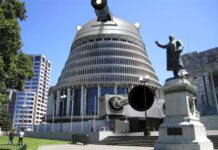What is the biggest potential driver of improved health outcomes? Is it our public hospitals? Is it what happens in primary care which, in Aotearoa New Zealand, is largely provided by general practitioners? Or is it something else?
There are also some who believe that health restructuring improves health outcomes while forgetting that function and cultural change trump form and structural change respectively any day of the week. Unfortunately, these fantasisers put the health system at risk when they hold influential positions in it.
These delusional people largely reside with the Minister of Health and in his office, within the Prime Minister’s department, in some senior levels of the new Te Whatu Ora (Health New Zealand), and among business consultants who, needless to say, are the biggest financial beneficiaries.

Health Minister Andrew Little: Fantasiser-in-chief?
Such is the fraudulent reality of this misplaced belief in restructuring that it deserves no further substantive comment in this blog.
Hospitals and primary care
Public hospitals do improve health outcomes for many but their role is to try to fix what the rest of the health system can’t. Patients generally come to hospitals because they are emergency cases, they have chronic illnesses requiring continual treatment, or are referred by general practitioners for either acute or planned treatment.
GPs and other primary care providers are invaluable ‘clinical gatekeepers’ for hospital access. The Labour-led government of Helen Clark believed that if more people accessed primary care, the pressure on hospitals would reduce.
This was true to an extent. Through the district health boards established by her government, GP consultations increased by over a million. In a population then under five million, this was impressive. Certainly, for many of those additional patients who accessed primary healthcare, this intervention meant that they did not end up in hospital with more serious illnesses. Its preventative role was big.

Prime Minister Helen Clark’s government in the 2000s greatly increased access to primary care, but…
But there is another side to this particular coin. These increased consultations also identified more serious unmet need that did require hospital admission. In other words, Clark’s government was ‘too successful’.
In improving access to primary care, not only did this improve many patients’ quality of life, it also unintentionally increased hospital admissions.
Both hospital and primary healthcare have their limitations as drivers of improved health outcomes for New Zealanders. The biggest drivers of poor health are external to the health system which has no control over them.
These external drivers are called social determinants of health. Controlling these determinants depends on government legislated and policy decisions.
Smoking as a driver of poor health: Helen and Hone
The most significant social determinant of health is low income with poor housing among its fellow travellers. On 23 August, BusinessDesk published my article on another fellow traveller – smoking: The grocery product that kills when used as intended.
About 5,000 New Zealanders die each year because of smoking or being exposed to second-hand smoke. Annual cancer deaths in New Zealand are about 9,000; one in four of these deaths is due to tobacco.
But it is not just avoidable mortality. Thousands suffer from permanent damage to their lungs or heart and untreatable blindness; all of which is also avoidable.
When health minister in the latter years of the third Labour government (1984-90), Helen Clark gave a significant boost to New Zealand’s declining smoking rates through her steps to combat tobacco company sponsorships, including big sporting events.
These decisions were profound for the time. Despite bitter opposition from vested interests, her efforts gave anti-smoking campaigns much traction.

Hone Harawira instrumental in setting the smokefree goal for 2025
Then, in 2011, Māori Party MP Hone Harawira, the Māori Affairs select committee chair, successfully recommended the adoption the National-led government of a smokefree goal of less than 5% of New Zealanders being smokers by 2025.
Along came Ayesha
In December 2021, under the Labour government, the Smokefree Aotearoa 2025 Action Plan was launched. Now Associate Minister of Health Dr Ayesha Verrall has introduced into Parliament the Smokefree Environments and Regulated Products (Smoked Tobacco) Amendment Bill.
As a medical specialist (infectious diseases) Dr Verrall brings immense expertise to the health portfolio. This is a huge plus for the health system, patients and health professionals.
The Bill’s measures include reducing the number of retail outlets that can sell tobacco and setting limits on nicotine levels and other ingredients.

Dr Ayesha Verrall: a clever, powerful and striking anti-smoking bill
The most powerful and striking measure, however, is amending the age limits for sale of smoked tobacco products by prohibiting their sale to anyone born on or after 1 January 2009.
In other words, endeavour to have a ‘smokefree generation’ policy by preventing young people, and the generations that follow them, from ever taking up smoking in the first place.
The impact of this especially and the other measures will be huge including increasing the life expectancy of those with much higher smoking rates, such as Māori women. There will be a loss in tax revenue from tobacco.
But this revenue loss will be offset by reduced healthcare costs as we see both lung and heart disease decline. Tax revenue should also increase with more people becoming able to work.
What Helen Clark, Hone Harawira and now Ayesha Verrall demonstrate is that government legislation and policies which address the external determinants of poor health can become the biggest driver of improved health outcomes. If this was applied to addressing low incomes, then improvement would be even greater.
Finally, let me quote from my concluding comment in BusinessDesk:
Verrall’s legislative initiatives will do infinitely more for the wellbeing of New Zealanders and the health system’s sustainability than her senior health minister’s obsession with distracting restructuring to drive improvements in the system.
Ian Powell was Executive Director of the Association of Salaried Medical Specialists, the professional union representing senior doctors and dentists in New Zealand, for over 30 years, until December 2019. He is now a health systems, labour market, and political commentator living in the small river estuary community of Otaihanga (the place by the tide). First published at Otaihanga Second Opinion





“But this revenue loss will be offset by reduced healthcare costs”
It was my understanding that the tobacco excise take was far greater than the socialised cost of smoking, so I’d love to see some figures to the contrary instead of just the claim.
I’ve seen no indication this was true. Indeed, having people die later as a result of smoking cessation almost certainly doesn’t save money, but increases the amount spend on healthcare in the later years of their life as a result of their having later years of their life.
Does that mean we shouldn’t do it- no. Obviously someone getting more time with their grandkids and vice versa is a good regardless of costs. But it won’t necessarily have a positive effect on government budgets, so that shouldn’t be oversold.
It would be good to see more provision of primary care at neighborhood levels, as in Cuba. Very good outcomes at relatively low costs from this.
I also said there would be increased tax revenue from more people being able to work in paid employment. The assessment was by public health specialists.
the tobacco excise take was far greater than the socialised cost of smoking”
You can thank Pharmac for some of that. Just don’t bother funding treatments and it’s a lot cheaper. Ok so they now fund some for ALK positive and EGFR positive (though very much the older meds) patients. The reality is there are a whole heap of patients who get nothing.
I understand the earlier deaths from smoking offset the cost to public health.
“Let your food be your medicine & your medicine be your food” is an old motto although I have forgotten the author’s name who deserves the credit. When we have a food industry aiming to maximize profit & a health system busy treating symptoms from people’s lifestyle choices there is unlikely to ever be enough money available to provide the health system we want. You mention Tobacco control where government action has reduced demand so there is no reason why various forms of encouragement should not be used to enable healthy food choices that will improve the health of the population. I can appreciate that this will be unpopular with many so it will need to be introduced gradually.
Bonnie the health of many countries has improved immensely commensurate with a rise in meat and dairy products in the diet.
Where does the promotion of smoking drugs fit?
Well weed for one does not have to be smoked. It can be ingested. Any way who is “promoting” it?
Yes I’m aware of that.
I took it as implicit but if you’re saying smoking drugs will not be allowed then ok I didn’t know that.
that’s because it will be smoked and we KNOW weed can cause lung cancer… now if you wanna take that risk all the constraints smokers have applies.
so why does ‘smokefree’ hate on vaping? a safer alternative that uses a non-carcinogen namely nicotine on the grounds it’s addictive not unlike caffeine which the middle class deify…or the spurious ‘well vape looks like smoke so it is smoke’ the problem is years ago ago s-free went with a series of unscientific untruths and being a bureaucracy can’t/won’t back peddle on even if that means people dying because the safer alternative is politically unacceptable….one might even suspect the ‘demographic’ that continues to smoke don’t matter to paid career smokefree employees- let’s face it if smoking stops so does their gravy train, it reminds me of the dimwits who oppose needle exchange programmes..the deaths don’t matter as long as the message is ‘pure’.
we do nothing about american/aussie carcinogenic food additives and household chemicals but obsess about a non carcinogenic(even in california, where everything is ‘carcinogenic’) habit, yes it is habit forming but it’s not a deadly habit.
and before anyone chips in lung problems are only caused by vaping cannabinoids not nicotine and we know pot can cause lung cancer.
if anyone from smokefree cares to debate this let’s do it…I’ve e-mailed several reporters of unscientific opinion pieces but none care to reply…it’s almost like they know they’re peddling crap.
sorry to you guys for this rant but ‘it really grinds my gears’
Don’t be sorry gagarin I share your frustration.
There is so much focus on smoking. We are at point where we should look at the benefits of reducing air pollution in the main cities. How much money would taxpayers save doing that! Respiratory disease costs us big time through illness and death. It’s not like people can choose not to breathe.
If the government is going to ban dairies from selling smokes they should be compensated otherwise they will close .If they close poor families in the area will have to drive if they are lucky or walk further to get their milk and bread . Large grocery stores will benefit families will lose out
wot no takers from smokefree here to challenge my assertions, c’mon there must be a member of your ‘comms team’ watching TDB or are you all just cowards?
They’re on a smoko break.
nice one bob